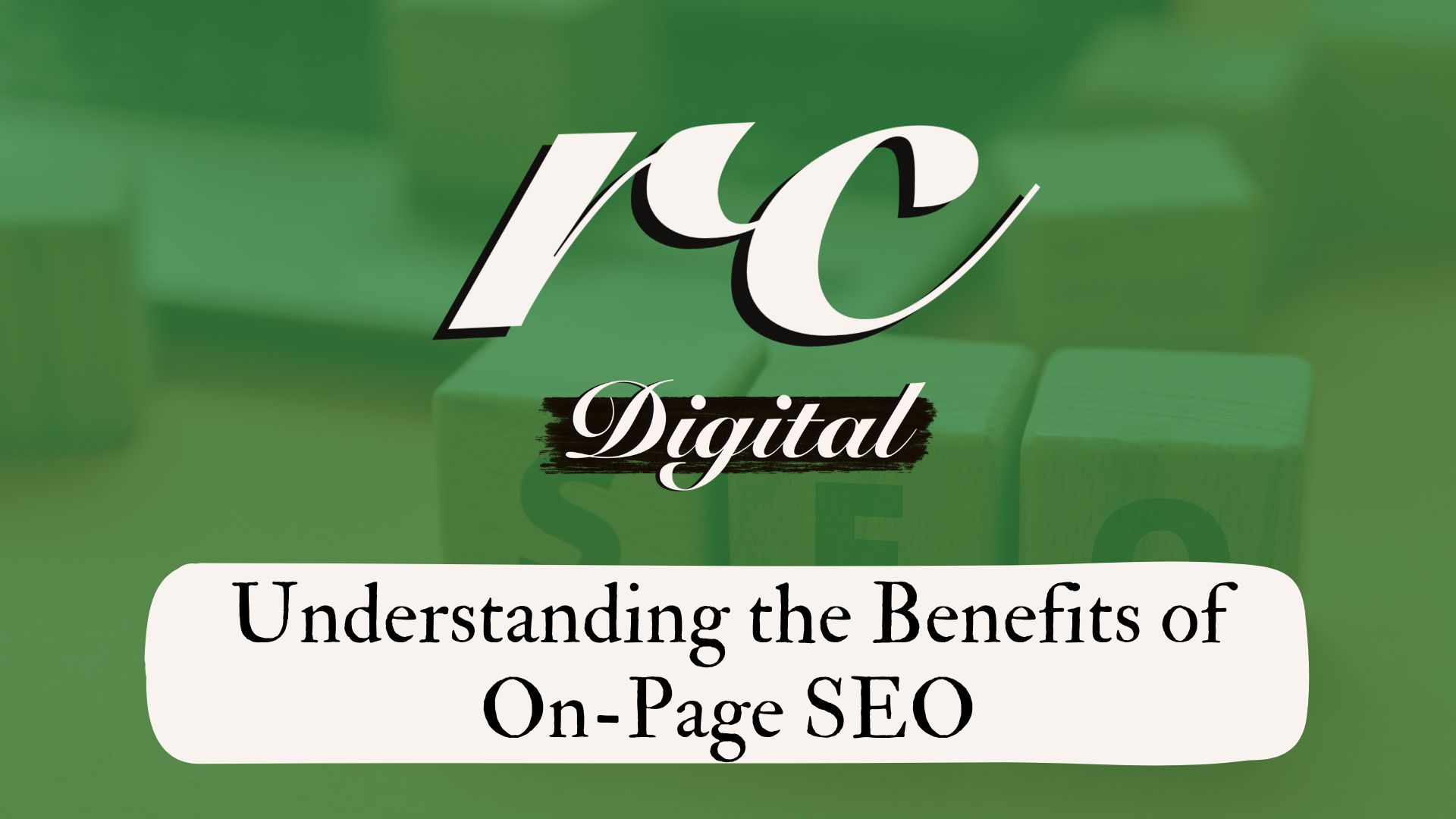Understanding the Benefits of On-page SEO

Table of Contents
In today’s digital age, having a strong online presence is crucial for any business or organization. One of the key ways to improve your online visibility and attract more traffic to your website is through search engine optimization (SEO). On-page SEO is a crucial aspect of any SEO strategy, as it involves optimizing the content and structure of your web pages to make them more attractive to search engines and users alike.
Benefits of On-Page SEO

The benefits of on-page SEO are numerous and far-reaching. By optimizing your website’s content, structure, and other on-page elements, you can improve your website’s rankings in search engine results pages (SERPs), making it easier for potential customers to find you online.
This increased visibility can lead to more traffic, higher click-through rates, and ultimately, more conversions and sales. On-page SEO can also help improve the user experience of your website by making it more organized, navigable, and user-friendly. Additionally, on-page SEO can help you stay competitive in today’s crowded digital landscape, by ensuring that your website is optimized for the latest search engine algorithms and user behaviors. Overall, on-page SEO is an essential tool for any business or organization that wants to improve its online presence and attract more customers.
Key Elements of On-Page SEO
On-page SEO refers to the elements of your website that you have direct control over, such as the content, titles, descriptions, and URLs of your web pages. By optimizing these elements, you can improve your website’s rankings in search engine results pages (SERPs), making it easier for potential customers to find you online.
Here are some of the key on-page SEO factors to consider when optimizing your website:
Keywords
Keywords are the words or phrases that users type into search engines when looking for information online. By including relevant keywords in your web page content, titles, and meta descriptions, you can help search engines understand what your content is about and improve your rankings for those keywords.
Title tags
Your title tag is the text that appears in the search engine results when someone searches for a particular keyword or phrase. It should be descriptive, concise, and include your primary keyword. It’s also a good idea to include your brand name in the title tag, as this can help build brand awareness and credibility.
Meta descriptions
The meta description is a brief summary of your web page content that appears in the search engine results. It should be informative, concise, and include your primary keyword. A compelling meta description can also help improve click-through rates and drive more traffic to your website.
Header tags
Header tags (H1, H2, H3, etc.) are used to structure your web page content and make it easier to read. Including your primary keyword in the H1 tag can help signal to search engines what your page is about and improve your rankings for that keyword.
Image optimization
Header tags (H1, H2, H3, etc.) are used to structure your web page content and make it easier to read. Including your primary keyword in the H1 tag can help signal to search engines what your page is about and improve your rankings for that keyword.
URL structure
The structure of your website’s URLs can also impact your search engine rankings. Ideally, your URLs should be descriptive and include your primary keyword. For example, a good URL for a blog post about on-page SEO might be “www.example.com/on-page-seo-best-practices.”
Internal linking
Internal linking refers to linking to other pages on your website from within your web page content. This can help search engines understand the structure of your website and improve your rankings for relevant keywords. It can also help users navigate your website more easily and find the information they are looking for.
Final Thoughts
it’s clear that on-page SEO plays a crucial role in the success of any SEO strategy. When you optimize your website’s content, titles, descriptions, URLs, images, and internal links, you enhance your website’s visibility in search engine results pages and drive more traffic to your website. To stay ahead in the ever-changing digital world, it’s essential to stay informed of the latest best practices and techniques and incorporate them into your on-page optimization efforts. By doing so, you can ensure that your website remains relevant and competitive, and attract more customers to your business or organization.
Now that you have learned about the importance of on-page SEO, it’s time to put these strategies into action. Conduct a thorough analysis of your website’s on-page elements, identify areas for improvement, and implement the best practices discussed in this article. By optimizing your web page content, titles, descriptions, URLs, images, and internal links, you can improve your website’s visibility in search engine results pages and attract more traffic to your website. Start taking steps towards a more effective on-page SEO strategy today and watch your online presence grow.
If you need complete SEO services, feel free to contact me or give RankMath SEO plugin a try, as it offers a precise guide for all your On-page SEO requirements. I’d be delighted to help you achieve your on-page SEO objectives and improve your website’s visibility in search engine results pages.
[…] process of acquiring hyperlinks from other websites to your own website. It is an essential part of search engine optimization (SEO) as search engines use links to evaluate the authority and relevance of a […]
[…] visibility on various search engines. If you’re working on your website’s on-page SEO, you’ve likely come across SEO […]
[…] On-Page SEO […]
Awesome blog! Do you have any suggestions for aspiring writers?
I’m hoping to start my own site soon but I’m a little lost on everything.
Would you suggest starting with a free platform like WordPress or go for a paid
option? There are so many choices out there that I’m totally overwhelmed ..
Any tips? Thanks a lot!
Hi there Denise! Thanks for the comment about the blog.
Well, there are two variants of WordPress available: the free version and the self-hosted option.
If you have budget to spare, my recommendation would lean towards the self-hosted alternative. This choice gives you the freedom to design your site according to your preferences without any limitations. Additionally, you can purchase a domain that has your brand’s identity. Achieving this involves leasing a web server, such as those provided by hostinger, and installing WordPress on it. If your plan is to establish freelancing as your primary source of income, the paid option would be my best suggestion.
On the other hand, if you are just starting out, you can select any suitable medium (free or paid) to showcase your work. Just make sure you can easily migrate your content once your business grows. Especially for writers, building a bond with clients might take time before they permit you to feature them on your website, most wouldn’t allow it at all due to non-disclosure agreements. Therefore, you might need to craft samples of your work to showcase on your site.
For instance, consider this blog post as an example. It fulfills multiple objectives – serving the freelance community as a resource, helping out startup businesses without an extensive budget, satisfying my passion for writing, while also functioning as a display of work for potential clients.
Hope this helps! If you have more questions, just ask away.
Wishing you the very best in your freelancing journey! 🙂
Hello my family member! I want to say that this article is amazing, great written and
include almost all vital infos. I’d like to see extra posts like this .
Thank you for your comment! Will surely add more posts like this. 🙂
Hi superb website! Does running a blog similar to this take a lot of work?
I have very little expertise in computer programming but I had been hoping to
start my own blog soon. Anyways, if you have any ideas or tips for new blog owners please share.
I know this is off subject but I simply had to ask. Thanks a lot!
Hey, thanks for your comment! Making a blog or any website might seem like a lot of work, but it mostly depends on how you look at it. What I’m sure of is that it takes commitment to keep them updated with content and make your site look better to consistently get organic traffic. The good thing is you can do this at your own pace. Start with the basics, like using a pre-made theme on a system like WordPress, and share your content. Then, little by little, make your design better and learn some SEO strategies for getting noticed online. Eventually, managing your site/blog will become something you’re used to, and what used to be hard will just be a regular part of your day. 🙂
Thanks for your suggested topic, I’ll add it to my list of things to write about! <3
[…] resonate with my passion. I honed my expertise in web development, business development, sales, search engine optimization, and copywriting before committing to turning these skills into something I could sell […]